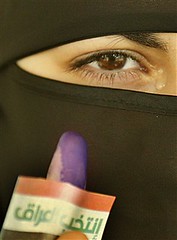Signs of Hope
 The news of wider-than-expected voter turnout in Iraq on Sunday is the first glimmer of hope I've seen about the Iraq situation in a long time. I think the world was expecting horrific violence and low voter turnout, but the opposite happened. Yes, there were election-related attacks by insurgents. But the Iraqi electorate, through sheer force of popular will, seemed to rise as one to take control of the future of their country.
The news of wider-than-expected voter turnout in Iraq on Sunday is the first glimmer of hope I've seen about the Iraq situation in a long time. I think the world was expecting horrific violence and low voter turnout, but the opposite happened. Yes, there were election-related attacks by insurgents. But the Iraqi electorate, through sheer force of popular will, seemed to rise as one to take control of the future of their country.
Through their collective acts of courage to make it to the polling centers to vote, they highlighted the following points:
1. They dispelled the notion that Arabs are somehow disinterested in the notion of democracy. One of the more compelling stories I witnessed was shown on NBC News Sunday night. They showed an 80 year old Iraqi man, supported by two family members, struggling to walk over a mile to his polling place just to cast a ballot. I know people here in the US who won't vote because it rains. That story of the old Iraqi man just reinforced my belief that those in the United States who don't exercise their right to vote are dishonoring the thousands of American soldiers through history who have died to defend that right, as well as those who have died bringing that right to the Iraqis.
2. They disavowed the terrorist tactics of the insurgents. It seemed to take something like a framework of a national election, where many voices could speak out "as one," for Iraqis to voice their opinions on the insurgents. It was too dangerous to speak out individually, for they could become targets of the insurrection. Also, to have spoken out individually against the insurgents would have risked labeling them as US sympathizers or collaborators. But in voting in a national election, they could display their nationalistic pride whilst at the same time sending a message to the insurgents: "We do not approve of your tactics."
That being said, this is but the first step. Many other things have to happen in order to make sure that this first, positive step taken by the Iraqi people is not a wasted opportunity for real democratic progress:
1. The Sunni question. At the time of this writing, it is still unclear to what extent the Sunnis participated in this election. Regardless of the actual turnout figure for Sunnis, it is vital that efforts be taken to include Sunnis in the next phase of the rebuilding of Iraq. It would be disastrous if the Shiites, who are widely expected to gain power through the results of these elections, allowed the Sunnis to feel disenfranchised and gave them any sort of excuse to disregard these elections as invalid. Diplomacy is vital here, and I hope that the newly elected government can make its way through the Sunni Question. US participation can help, but I feel that the UN must take the lead here. US participation will just give the Sunnis another excuse to claim the election is invalid.
2. Infrastructure improvements must accelerate. Despite the enthusiasm shown in voting, there must be tangible improvements in the day-to-day lives of Iraqis if democracy is to take root. Participation in democracy in an of itself is meaningless unless the Iraqi people feel that it has made a difference in their lives. The US must put its money where its mouth is and spend the capital necessary to improve the infrastructure that has been destroyed in the war. Yes, the insurgents are actively sabotaging that effort, but if no effort is shown to be made what motivation will Iraqis have to rise up and defend their country? If an Iraqi hasn't had running water since the US invasion, he's going to wait until the US rebuilds his water supply.
3. There must be progress made in the Palestinian-Israeli conflict. US policy in this area is at the heart of many Muslims' antagonism towards the US. The passing of Yasser Arafat, whom President George W. Bush famously refused to work with, and the passing of power to Mahmoud Abbas and his more constructive and progressive attitudes, have created conditions where the Palestinian-Israeli peace process can finally make some significant strides. Up until now the US has done virtually nothing to promote the peace process. I hope that the Bush administration can finally see the enormous opportunities that have presented themselves in that region, and move strongly and decisively towards helping both sides achieve peace in the region.
This is as important, if not more so, to the fight against terrorism than the nascent democratic process now unfolding in Iraq. Just because Iraqis have participated in free elections does not mean that terrorism will decrease. Local insurgent activity in Iraq will most likely increase as Sunnis try to de-legitimize the election. And the underlying realities of war mean that a new pool of young men and women with anti-US leanings are ready to be recruited into the terrorism network. Even if democracy successfully takes hold in Iraq -- and it is still an "if" -- it will take a generation or more for its effects to make a meaningful difference in the attitudes that promote terrorism. I believe that progress in the Palestinian-Israeli issue will have more of an effect in the shorter term.


No comments:
Post a Comment